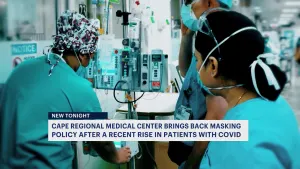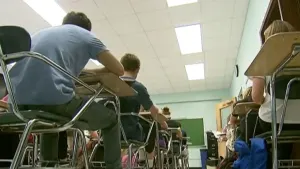Study: 75% of college students reported uncontrollable worry during COVID-19 pandemic
A new study from Montclair State University found that the COVID-19 pandemic has negatively impacted college students. The virus has harmed them academically, financially and mentally.
•
Mar 3, 2022, 12:52 AM
•
Updated 1,186 days ago
Share:
More Stories
0:33

US Supreme Court rejects appeal on Rutgers University COVID-19 vaccine mandate case
341ds ago
Nobel in medicine goes to 2 scientists whose work enabled creation of mRNA vaccines against COVID-19
608ds ago0:21

Biden administration announces $600M to produce COVID tests and will reopen website to order them
619ds ago
Murphy administration: No plans to implement any COVID-19 restrictions
625ds ago0:39

Cape May hospital asking patients to wear mask amid COVID surge
626ds ago2:57

Lawmakers call for investigation, overhaul following DOJ report about NJ’s COVID response in veterans homes
628ds ago0:33

US Supreme Court rejects appeal on Rutgers University COVID-19 vaccine mandate case
341ds ago
Nobel in medicine goes to 2 scientists whose work enabled creation of mRNA vaccines against COVID-19
608ds ago0:21

Biden administration announces $600M to produce COVID tests and will reopen website to order them
619ds ago
Murphy administration: No plans to implement any COVID-19 restrictions
625ds ago0:39

Cape May hospital asking patients to wear mask amid COVID surge
626ds ago2:57

Lawmakers call for investigation, overhaul following DOJ report about NJ’s COVID response in veterans homes
628ds agoA new study from Montclair State University found that the COVID-19 pandemic has negatively impacted college students. The virus has harmed them academically, financially and mentally.
“My entire junior year – 2021 – I was inside,” says Montclair senior Avery Noerr.
Noerr says that she struggled during the height of the pandemic – socially, academically and mentally.
“I feel like I lost my social aspect, but I also lost the drive to do schoolwork,” she says. “A lot of stuff was on Zoom. I’d basically roll out of bed, open my laptop, do class, close it and roll over and go back to sleep.”
Noerr says she is doing much better now, feeling motivated and enjoying her last few months of college. But she is not alone in her experience – a fact that was proven by the Montclair State Psychology Department.
“College students are particularly vulnerable for mental health problems,” says Dr. Jazmin Reyes-Portillo, an assistant professor in the department. “We’d only expect a stressor like the pandemic to lead to a worsening of mental health symptoms.”
Reyes-Portillo is the co-author of a new study on the physiological, academic and economic impact of COVID-19 on college students. Researchers surveyed more than 4,700 students from colleges and universities across New Jersey and New York.
The study found that 75% of the students reported feeling more anxious with uncontrollable worry, 68% reported sleep problems and 60% felt hopeless. These are all factors that researchers say can heighten the risk of suicidal thoughts or behaviors.
“As a psychologist, you never want to see people in distress, and it's always cause for concern,” Reyes-Portillo says.
The study also found a big difference between the number of minority students and white students who were worried about being able to continue their education because of financial reasons.
"Unfortunately there are a lot of disparities and inequities in our society that the pandemic has highlighted and magnified,” Reyes-Portillo says. “And our findings reflect that.”
The hope is these findings will help institutions of higher learning, families and the public find ways to more effectively notice, and better support struggling and stressed students.
The study was conducted during the spring 2020 semester.
More from News 12
0:41

Cost Of: Year-end gifts for teachers
1:56

Newark Public Schools holds 37th annual Math Olympics
0:48

Bill Nye surprises Newark students with assembly to honor favorite teacher
2:13

Ocean County College graduation ceremonies staggered to allow more guests to attend
1:57

Rutgers University research continues to put New Jersey on the map
0:54
